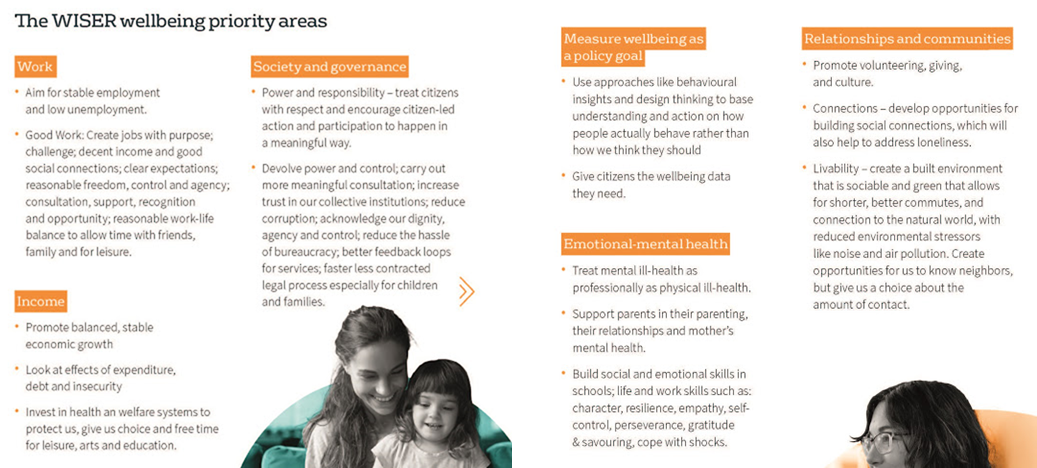Our Strategy 2020: What works to improve wellbeing? Six years on
This month, the Centre celebrates its sixth anniversary. To mark it, we are publishing our updated strategy, setting out our priorities – now and for the future.
The Centre was set up by the Government in 2014 in response to the O’Donnell Commission for Wellbeing & Policy, and to continue the implementation of the ONS’s National Wellbeing Measurement Programme that was established in 2010.
Why wellbeing
Wellbeing is defined by ONS as ‘how we’re doing’ – as individuals, communities and as a nation – and how sustainable it is for the future and by HM Treasury’s Green Book as social value or social welfare.
The Centre is part of a ‘quiet revolution’ to improve the UK’s wellbeing and reduce misery. We believe that the purpose of government and of civil society is to improve lives. This means that no policy or project is successful unless it improves or protects our wellbeing. Using wellbeing evidence to determine the effectiveness of different policies, approaches and actions, sometimes called interventions, can provide an essential complement to economic measures of success such as GDP or life expectancy alone.
Six years of action
We are taking practical steps towards making sure the country is focused on ‘what matters’ to people in our collective decision making. Since 2014 we have partnered with people and organisations from all sectors to find out what works to protect and improve wellbeing for whom, when, where, why, and how – and then put this evidence into action.
How we work
Our mission is to develop and share robust, accessible and useful evidence that governments, businesses, communities and people use to improve wellbeing across the UK.
There is already evidence of what works to improve wellbeing, and how to measure impact. We collaborate with other organisations to understand what’s known from the global evidence, to connect this evidence to action and to fill the gaps. We want to make a meaningful difference to people’s lives and we work across sectors to achieve this.
Since October 2014 we have worked with more than 30 universities and partners across the UK and beyond, to understand what works to improve wellbeing. We have built a learning system for wellbeing and established wellbeing economics, with the infrastructure to use wellbeing evidence:
- With civil society
- With central, devolved and local governments, health and the wider public sector
- With Business, employers and professions
- With academia, researchers and evaluators
At the Centre we focus on where we think we can make the biggest difference based on current expertise and networks, and where there are evidence and implementation gaps that are not already being addressed. Our priority areas for the future are:
- Working age and business
-
- Employment has one of the largest effects on wellbeing.
- Money and basic needs do matter, especially to those with relatively little.
- Connection and community
-
- Social connections are consistently found to be the strongest drivers of wellbeing.
- There are big geographical differences in wellbeing in the UK.
- Emotional and self-perceived health are also strong drivers of wellbeing.
- Methods and measures
-
- Our evidence reviews and work with policy and practitioners has shown the need for greater consistency and comparability of measures and concepts.
One piece of the sky
After six years we can now be more specific about which factors matter. Earlier this year we published Wellbeing Evidence at the Heart of Policy – our update to the Commission on Wellbeing and Policy and the WISER priorities for improving wellbeing. It contains evidence on the relationships between different aspects of our lives and individual wellbeing outcomes, and identifies categories that have the greatest impact.
This means that as individuals, we can distinguish between external factors that affect our lives, and our own internal psychological needs – a big step towards improving the wellbeing of the UK.

Wellbeing is not just one person or organisation’s job and we each hold up our bit of the sky. As we celebrate six years of hard work, we want to say a big thank you to all our partners, teams and colleagues – past and present – for moving the wellbeing evidence, policy and practice forward.
